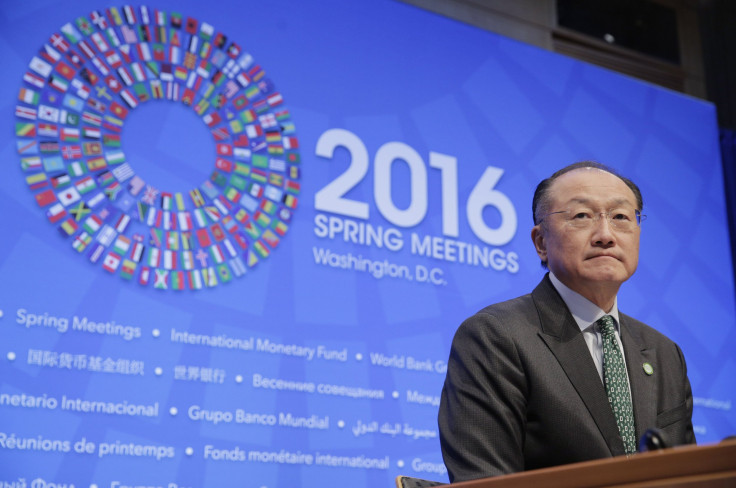IMF, World Bank Spring Meeting To Begin In Washington Amid Looming Global Growth Fears

The Spring Meetings of the International Monetary Fund (IMF) and the World Bank, which will bring central bankers, finance ministers, academics and private sector executives from around the globe, begin in Washington Friday. The three-day event comes at a time when threats to global economic growth — such as the slowdown in China and emerging economies and the looming specter of the U.K.’s departure from the European Union — have come into sharp focus.
“In the global economy, there are not many bright spots around the world — the United States is one among the developed economies and India is another among the middle-income countries,” World Bank Group President Jim Yong Kim said during a press conference Thursday. “Growth remains weak in Europe and Japan, and among emerging economies, Russia and Brazil are projected to post negative growth once again. We have just downgraded our global growth economic forecast this year to 2.5 percent from 2.9 percent.”
“The weakening global economy threatens our progress toward ending extreme poverty by 2030,” he added.
The IMF, on its part, has also been bearish on the global economy. Earlier this week, the lender, citing a “disappointing” pace of growth across the world, slashed its 2016 growth forecast by 0.2 percentage points, to 3.2 percent from an earlier 3.4 percent.
A year ago, IMF’s growth prediction for 2016 stood at 3.8 percent.
“There is recovery and there is growth, but it is too slow, too fragile,” IMF chief Christine Lagarde told CNBC Thursday. “When you look at poverty levels, when you look at the number of people unemployed, when you look at inflation, when you look at debt, all of that is not moving in the right direction.”
In recent months, there has been a marked rise in countries seeking emergency aid from the two global lenders. Last week, Angola — a country that derives 95 percent of its export earnings from oil and has been badly battered by the global drop in its prices — requested a three-year bailout program from the IMF. And, earlier this week, the World Bank said that in the fiscal year 2016, it is on track to lend as much as $25 billion to middle-income countries — all of which are reeling under the precipitous drop in commodity prices and exports — through its main lending arm, the International Bank for Reconstruction and Development.
“This increased demand underscores the importance for donor countries to support our replenishment this year for the International Development Association, or IDA, which gives low-cost loans or grants to the poorest countries,” Kim said Thursday. “A strong IDA replenishment this year will be essential for us to work on our goals to end extreme poverty and boost shared prosperity.”
Two crucial issues that have further muddled global growth outlook, and that are likely be discussed during the meeting, are the prospect of the so-called Brexit, which the IMF has repeatedly said could inflict “severe regional and global damage,” and the recent Panama Papers revelations that shed light on the rampant use of offshore tax havens by corporations.
“When taxes are evaded, when state assets are taken and put into these havens, all of these things can have a tremendous negative effect on our mission to end poverty and boost prosperity,” Kim said.
© Copyright IBTimes 2024. All rights reserved.












